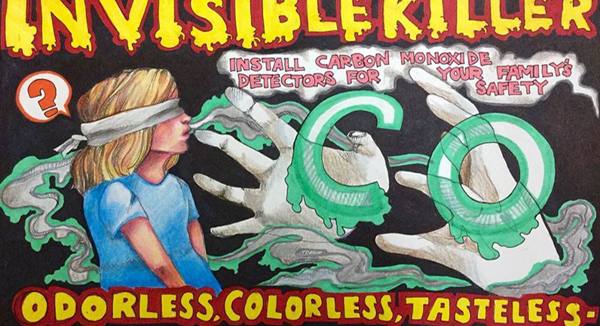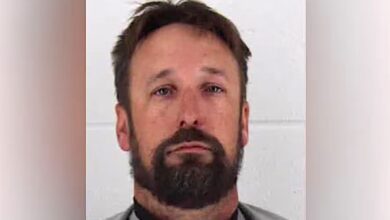State health, safety and fire experts offer info on “invisible killer” and free alarms

The arrival of colder weather means more homes will be turning up the heat with fuel-burning appliances. These appliances include furnaces, ovens, space heaters, generators, indoor grills and fireplaces that can unknowingly cause dangerous levels of carbon monoxide (CO) to build up in the home. However, CO alarms are available to warn of this danger.
According to the Centers for Disease Control and Prevention, from 2010 to 2015, an average of 374 people died each year from unintentional carbon monoxide poisoning in the United States. In Kansas, from 2011 to 2015, there were annually an average of 146 emergency department visits, 22 hospitalizations and 12 deaths due to unintentional carbon monoxide poisoning. On May 11, KDHE updated regulations for the reporting of notifiable disease conditions, adding CO poisoning to Kansas’ list of reportable diseases.
Kansas Department of Health and Environment, Safe Kids Kansas and the Kansas Office of the State Fire Marshal are teaming up to help address this situation.
“KDHE will use the reported information to better understand the circumstances of CO poisonings that occur in public settings in Kansas,” said Dr. Farah Ahmed, KDHE Environmental Health Officer and State Epidemiologist. “This additional information will be used to determine if there are any potential interventions that partners can help devise to reduce the risk of another CO poisoning event in the public location.”
“CO is known as the invisible killer because it is colorless and odorless,” said Cherie Sage, Safe Kids Kansas. “The symptoms of CO poisoning are similar to those of common winter ailments, like the flu. Without a CO alarm in your home, your family can be poisoned without even realizing it’s happening.” CO poisoning can happen suddenly or cause poisoning over a longer amount of time.
“Early detection can mean the difference between life and death when it comes to CO poisoning,” said State Fire Marshal Doug Jorgensen. “CO alarms, along with smoke alarms, are one of the best ways to provide protection in your home for your family.”
CO alarms cost approximately $20 and can be purchased at most hardware and retail stores. But the Kansas Office of the State Fire Marshal, through its Get Alarmed, Kansas program, is working with fire departments across the state to deliver and install free smoke alarms, which include CO detection. For more information on Get Alarmed, Kansas, visit, www.GetAlarmedKS.org. For more information about CO poisoning, visit www.safekids.org, or call the Poison Control Hotline at 800-222-1222.
Kansas homeowners interested in receiving a free smoke alarm for their home should FIRST contact their local fire department. Many fire departments already have free smoke alarms available as they already participate in our program. Kansas homeowners must be living in that home (not rental property). There are also alarms available for residents who are deaf or hard-of-hearing.
For Kansas renters, Kansas Statute 31-162, The Smoke Detector Act, states, “The owner of a structure shall supply and install all required smoke detectors.” If you are a renter in Kansas and need smoke alarms, contact your landlord, who is required by Kansas statute to provide “at least one smoke detector on every story of the dwelling unit.” The renter is responsible for “testing and maintaining the smoke detectors after taking possession of the dwelling unit.” The Get Alarmed Kansas program will not supply the owners of rentals with alarms. They will need to get them from another source.
Tips to protect your family from CO poisoning:
- Prevent CO buildup in the first place—make sure heating appliances are in good working order and used only in well-ventilated areas. Don’t run a car engine or any other gas-powered tool in the garage, even with the garage doors open. If you need to warm up your vehicle, move it outside first.
- Install alarms in the hallway near the bedrooms in each separate sleeping area and on every level of the home. Keep alarms at least 15 inches from all fuel-burning appliances.
- Follow manufacturer’s directions for installation, testing and using CO alarms. There are many options and styles to choose from, including hardwired, combination smoke and CO alarms, and battery operated. When you check your smoke alarm batteries each month, check the batteries on your CO alarms at the same time.
- Never use an oven or gas range for heating.
- Only use portable generators, gas camp stoves and charcoal grills outside with proper ventilation. They cannot be used indoors, inside of a garage or enclosed porch.
- If more than one person in the home suddenly feels ill for no apparent reason, or if a CO alarm goes off, get everyone outside immediately and call 911 from a pre-arranged meeting place. Pay attention to pets, sometimes they will show signs of illness first. Don’t go back inside until the fire department or gas company says it is safe.
Safe Kids Kansas is an organization that works to prevent childhood injury, the leading cause of death and disability to children. Safe Kids Kansas is a member of Safe Kids Worldwide, a global network of organizations dedicated to preventing injuries in children. Coalition members include over 70 statewide organizations, agencies and businesses and a network of local coalitions across the state. The Kansas Department of Health and Environment serves as the Lead Agency for the coalition. For more information visit www.safekidskansas.org or their Facebook page.
KDHE is the State agency that oversees the divisions of Environment, Public Health and Health Care Finance, which includes the Kansas Medicaid program known as KanCare. The agency of more than 1,000 employees seeks to protect and improve the health and environment of all Kansans. For more information visit www.kdheks.gov or their Facebook page.
The Office of the State Fire Marshal is dedicated to protecting the lives and property of the citizens of Kansas from the hazards of fire, explosion and hazardous materials. OSFM’s aim is to reduce the deaths, injuries, and property losses of Kansans through: inspection, enforcement, regulation, investigation, hazardous material incident mitigation and public education. For more information call 785-291-3586 or visit www.firemarshal.ks.gov or their Facebook page.

In Topeka the local Fire Department is located at 324 SE Jefferson St. The phone number is (785) 368-4000.
An application for a local alarm inspection or installation of a new alarm can be printed out or submitted online at
https://s3.amazonaws.com/cot-wp-uploads/wp-content/uploads/fire/smokealarmapp.pdf






